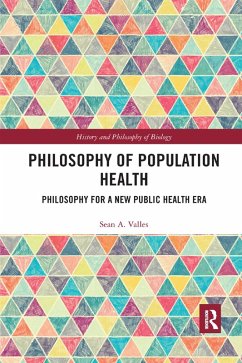- Broschiertes Buch
- Merkliste
- Auf die Merkliste
- Bewerten Bewerten
- Teilen
- Produkt teilen
- Produkterinnerung
- Produkterinnerung
Population health has recently grown from a series of loosely connected critiques of twentieth-century public health and medicine into a theoretical framework with a corresponding field of research-population health science. Its approach is to promote the public's health through improving everyday human life: afford-able nutritious food, clean air, safe places where children can play, living wages, etc. It recognizes that addressing contemporary health challenges such as the prevalence of type 2 diabetes will take much more than good hospitals and public health departments.
Blending…mehr
Andere Kunden interessierten sich auch für
![The Routledge Handbook of Philosophy of Public Health The Routledge Handbook of Philosophy of Public Health]() The Routledge Handbook of Philosophy of Public Health205,99 €
The Routledge Handbook of Philosophy of Public Health205,99 €![Global Health Global Health]() Kevin McCrackenGlobal Health46,99 €
Kevin McCrackenGlobal Health46,99 €![Turning the World Upside Down Again Turning the World Upside Down Again]() Nigel CrispTurning the World Upside Down Again67,99 €
Nigel CrispTurning the World Upside Down Again67,99 €![Turning the World Upside Down Again Turning the World Upside Down Again]() Nigel CrispTurning the World Upside Down Again27,99 €
Nigel CrispTurning the World Upside Down Again27,99 €![Health Reform Policy to Practice Health Reform Policy to Practice]() Health Reform Policy to Practice85,99 €
Health Reform Policy to Practice85,99 €![Belief, Behavior, and Health Belief, Behavior, and Health]() Sandra D. LaneBelief, Behavior, and Health158,99 €
Sandra D. LaneBelief, Behavior, and Health158,99 €![Socio-Gerontechnology Socio-Gerontechnology]() Socio-Gerontechnology121,99 €
Socio-Gerontechnology121,99 €-
-
-
Population health has recently grown from a series of loosely connected critiques of twentieth-century public health and medicine into a theoretical framework with a corresponding field of research-population health science. Its approach is to promote the public's health through improving everyday human life: afford-able nutritious food, clean air, safe places where children can play, living wages, etc. It recognizes that addressing contemporary health challenges such as the prevalence of type 2 diabetes will take much more than good hospitals and public health departments.
Blending philosophy of science/medicine, public health ethics and history, this book offers a framework that explains, analyses and largely endorses the features that define this relatively new field. Presenting a philosophical perspective, Valles helps to clarify what these features are and why they matter, including: searching for health's "upstream" causes in social life, embracing a professional commitment to studying and ameliorating the staggering health inequities in and between populations; and reforming scientific practices to foster humility and respect among the many scientists and non- scientists who must work collaboratively to promote health.
Featuring illustrative case studies from around the globe at the end of all main chapters, this radical monograph is written to be accessible to all scholars and advanced students who have an interest in health-from public health students to professional philosophers.
Blending philosophy of science/medicine, public health ethics and history, this book offers a framework that explains, analyses and largely endorses the features that define this relatively new field. Presenting a philosophical perspective, Valles helps to clarify what these features are and why they matter, including: searching for health's "upstream" causes in social life, embracing a professional commitment to studying and ameliorating the staggering health inequities in and between populations; and reforming scientific practices to foster humility and respect among the many scientists and non- scientists who must work collaboratively to promote health.
Featuring illustrative case studies from around the globe at the end of all main chapters, this radical monograph is written to be accessible to all scholars and advanced students who have an interest in health-from public health students to professional philosophers.
Produktdetails
- Produktdetails
- History and Philosophy of Biology
- Verlag: Routledge / Taylor & Francis
- Seitenzahl: 224
- Erscheinungstermin: 6. Juni 2019
- Englisch
- Abmessung: 258mm x 234mm x 15mm
- Gewicht: 410g
- ISBN-13: 9780367358624
- ISBN-10: 036735862X
- Artikelnr.: 57005420
- Herstellerkennzeichnung
- Libri GmbH
- Europaallee 1
- 36244 Bad Hersfeld
- gpsr@libri.de
- History and Philosophy of Biology
- Verlag: Routledge / Taylor & Francis
- Seitenzahl: 224
- Erscheinungstermin: 6. Juni 2019
- Englisch
- Abmessung: 258mm x 234mm x 15mm
- Gewicht: 410g
- ISBN-13: 9780367358624
- ISBN-10: 036735862X
- Artikelnr.: 57005420
- Herstellerkennzeichnung
- Libri GmbH
- Europaallee 1
- 36244 Bad Hersfeld
- gpsr@libri.de
Sean A. Valles is Associate Professor, jointly appointed to Michigan State University's Lyman Briggs College and Department of Philosophy, USA.
Acknowledgements
Chapter 1: Blueprint of a philosophy of-and for-population health science
A brief overview
Introduction
What is population health science?
Why write a book on philosophy of population health science?
What will this book accomplish?
What are the book's philosophical methods and commitments?
What this book is not, and what it will not do
Onward
Section 1 What should health mean in population health science?
Chapter 2 A brief history of the social concept of health and its role in population health science
Introduction
The biomedical model and the Biostatistical Theory of health
Population health as (metaphysically) social health
Health is (empirically) social
Conclusion: Moving toward a thoroughly social health concept of health
Case study: The Standing Rock Sioux Water Protectors
Chapter 3 Health as a life course trajectory of complete well-being in social context
Introduction: The many debates over health's meaning
Life Course Theory
Life course lesson 1: Health is best understood as a lifelong phenomenon, not in time slices
Life course lesson 2: Population health and individual health are best understood as co-developing dynamically
The World Health Organization's definition of health, not what it seems
The WHO definition of health is not an operationalized tool for health assessment; it is a toolbox that guides the gathering of tools
Making room for health pluralisms: metaphysical, empirical, ethical and methodological
Conclusion: An updated health concept for an expansive population health mission
Case Study: Addressing health disparities between Aboriginal Australians and settler Australians
Section 2 Which causes and effects matter most in population health?
Chapter 4 Expanding the boundaries of population health
Introduction: health as life course of complete well-being in social context calls for a broad health promotion mandate
Continuing from Chapter 3: 'Health issues' 'healthcare issues'
"Boundary problem" problems
Political theory and population health
An unnecessary philosophical assumption: If X becomes a public health problem then it must be primarily or exclusively a public health problem
An incorrect empirical prediction: Broad conceptions of public health predictably lead to harms to the public health professions or to the populations they serve
The epistemic risks of erring on the side of wide vs. narrow boundaries for public health
Conclusion: Expanding philosophy of population health to catch up with the science and practice
Case Study: Global climate change
Chapter 5 Prioritizing the right population health causes and effects
Introduction: Addressing population health problems at the roots
"Fundamental-cause theory": the wrong name for the right approach
"Fundamental causes": Paramount importance because of a unique type of stability
What is and isn't wrong with risk factors
Turning attention from "causes of cases" to "causes of incidence"
Philosophy of salutogenesis vs. philosophy of pathogenesis
Conclusion
Case study: Brazil's AIDS response
Section 3 How can population health science better promote health equity?
Chapter 6 Managing the inevitable trade-offs in population health science practice
Introduction
The problem of heterogeneity: Lumping vs. splitting in population health
The high risk approach vs. the population approach
Decentering the healthcare system to promote population health vs. expanding outward from the healthcare system
Evidence-based medicine vs. public health pragmatism
Conclusion
Case study: the heterogeneous health of migrants
Chapter 7 Ethics and Evidence in the Population Health Equity Debates
Introduction: Population health science and health equity
Health equity is built into population health science
The (real and imagined) consequences of an ambiguous understanding of "health equity"
Equitable health promotion and health governance
Hypothetical problems' outsized influence in population health equity deliberations
Conclusion
Case study: Investigating racism and racial health disparities
Conclusion
Chapter 8 Humility as the way forward for population health science, and philosophy thereof
Introduction: A spirit of humility and collaboration
Embracing epistemic humility
Sectoral humility: Non-hierarchical intersectorality
Disciplinary Humility: Non-hierarchical interdisciplinarity
Population health science education for health professionals
Population health science education for all
Philosophy of population health science, from a position of service
Chapter 1: Blueprint of a philosophy of-and for-population health science
A brief overview
Introduction
What is population health science?
Why write a book on philosophy of population health science?
What will this book accomplish?
What are the book's philosophical methods and commitments?
What this book is not, and what it will not do
Onward
Section 1 What should health mean in population health science?
Chapter 2 A brief history of the social concept of health and its role in population health science
Introduction
The biomedical model and the Biostatistical Theory of health
Population health as (metaphysically) social health
Health is (empirically) social
Conclusion: Moving toward a thoroughly social health concept of health
Case study: The Standing Rock Sioux Water Protectors
Chapter 3 Health as a life course trajectory of complete well-being in social context
Introduction: The many debates over health's meaning
Life Course Theory
Life course lesson 1: Health is best understood as a lifelong phenomenon, not in time slices
Life course lesson 2: Population health and individual health are best understood as co-developing dynamically
The World Health Organization's definition of health, not what it seems
The WHO definition of health is not an operationalized tool for health assessment; it is a toolbox that guides the gathering of tools
Making room for health pluralisms: metaphysical, empirical, ethical and methodological
Conclusion: An updated health concept for an expansive population health mission
Case Study: Addressing health disparities between Aboriginal Australians and settler Australians
Section 2 Which causes and effects matter most in population health?
Chapter 4 Expanding the boundaries of population health
Introduction: health as life course of complete well-being in social context calls for a broad health promotion mandate
Continuing from Chapter 3: 'Health issues' 'healthcare issues'
"Boundary problem" problems
Political theory and population health
An unnecessary philosophical assumption: If X becomes a public health problem then it must be primarily or exclusively a public health problem
An incorrect empirical prediction: Broad conceptions of public health predictably lead to harms to the public health professions or to the populations they serve
The epistemic risks of erring on the side of wide vs. narrow boundaries for public health
Conclusion: Expanding philosophy of population health to catch up with the science and practice
Case Study: Global climate change
Chapter 5 Prioritizing the right population health causes and effects
Introduction: Addressing population health problems at the roots
"Fundamental-cause theory": the wrong name for the right approach
"Fundamental causes": Paramount importance because of a unique type of stability
What is and isn't wrong with risk factors
Turning attention from "causes of cases" to "causes of incidence"
Philosophy of salutogenesis vs. philosophy of pathogenesis
Conclusion
Case study: Brazil's AIDS response
Section 3 How can population health science better promote health equity?
Chapter 6 Managing the inevitable trade-offs in population health science practice
Introduction
The problem of heterogeneity: Lumping vs. splitting in population health
The high risk approach vs. the population approach
Decentering the healthcare system to promote population health vs. expanding outward from the healthcare system
Evidence-based medicine vs. public health pragmatism
Conclusion
Case study: the heterogeneous health of migrants
Chapter 7 Ethics and Evidence in the Population Health Equity Debates
Introduction: Population health science and health equity
Health equity is built into population health science
The (real and imagined) consequences of an ambiguous understanding of "health equity"
Equitable health promotion and health governance
Hypothetical problems' outsized influence in population health equity deliberations
Conclusion
Case study: Investigating racism and racial health disparities
Conclusion
Chapter 8 Humility as the way forward for population health science, and philosophy thereof
Introduction: A spirit of humility and collaboration
Embracing epistemic humility
Sectoral humility: Non-hierarchical intersectorality
Disciplinary Humility: Non-hierarchical interdisciplinarity
Population health science education for health professionals
Population health science education for all
Philosophy of population health science, from a position of service
Acknowledgements
Chapter 1: Blueprint of a philosophy of-and for-population health science
A brief overview
Introduction
What is population health science?
Why write a book on philosophy of population health science?
What will this book accomplish?
What are the book's philosophical methods and commitments?
What this book is not, and what it will not do
Onward
Section 1 What should health mean in population health science?
Chapter 2 A brief history of the social concept of health and its role in
population health science
Introduction
The biomedical model and the Biostatistical Theory of health
Population health as (metaphysically) social health
Health is (empirically) social
Conclusion: Moving toward a thoroughly social health concept of health
Case study: The Standing Rock Sioux Water Protectors
Chapter 3 Health as a life course trajectory of complete well-being in
social context
Introduction: The many debates over health's meaning
Life Course Theory
Life course lesson 1: Health is best understood as a lifelong phenomenon,
not in time slices
Life course lesson 2: Population health and individual health are best
understood as co-developing dynamically
The World Health Organization's definition of health, not what it seems
The WHO definition of health is not an operationalized tool for health
assessment; it is a toolbox that guides the gathering of tools
Making room for health pluralisms: metaphysical, empirical, ethical and
methodological
Conclusion: An updated health concept for an expansive population health
mission
Case Study: Addressing health disparities between Aboriginal Australians
and settler Australians
Section 2 Which causes and effects matter most in population health?
Chapter 4 Expanding the boundaries of population health
Introduction: health as life course of complete well-being in social
context calls for a broad health promotion mandate
Continuing from Chapter 3: 'Health issues' ¿ 'healthcare issues'
"Boundary problem" problems
Political theory and population health
An unnecessary philosophical assumption: If X becomes a public health
problem then it must be primarily or exclusively a public health problem
An incorrect empirical prediction: Broad conceptions of public health
predictably lead to harms to the public health professions or to the
populations they serve
The epistemic risks of erring on the side of wide vs. narrow boundaries for
public health
Conclusion: Expanding philosophy of population health to catch up with the
science and practice
Case Study: Global climate change
Chapter 5 Prioritizing the right population health causes and effects
Introduction: Addressing population health problems at the roots
"Fundamental-cause theory": the wrong name for the right approach
"Fundamental causes": Paramount importance because of a unique type of
stability
What is and isn't wrong with risk factors
Turning attention from "causes of cases" to "causes of incidence"
Philosophy of salutogenesis vs. philosophy of pathogenesis
Conclusion
Case study: Brazil's AIDS response
Section 3 How can population health science better promote health equity?
Chapter 6 Managing the inevitable trade-offs in population health science
practice
Introduction
The problem of heterogeneity: Lumping vs. splitting in population health
The high risk approach vs. the population approach
Decentering the healthcare system to promote population health vs.
expanding outward from the healthcare system
Evidence-based medicine vs. public health pragmatism
Conclusion
Case study: the heterogeneous health of migrants
Chapter 7 Ethics and Evidence in the Population Health Equity Debates
Introduction: Population health science and health equity
Health equity is built into population health science
The (real and imagined) consequences of an ambiguous understanding of
"health equity"
Equitable health promotion and health governance
Hypothetical problems' outsized influence in population health equity
deliberations
Conclusion
Case study: Investigating racism and racial health disparities
Conclusion
Chapter 8 Humility as the way forward for population health science, and
philosophy thereof
Introduction: A spirit of humility and collaboration
Embracing epistemic humility
Sectoral humility: Non-hierarchical intersectorality
Disciplinary Humility: Non-hierarchical interdisciplinarity
Population health science education for health professionals
Population health science education for all
Philosophy of population health science, from a position of service
Chapter 1: Blueprint of a philosophy of-and for-population health science
A brief overview
Introduction
What is population health science?
Why write a book on philosophy of population health science?
What will this book accomplish?
What are the book's philosophical methods and commitments?
What this book is not, and what it will not do
Onward
Section 1 What should health mean in population health science?
Chapter 2 A brief history of the social concept of health and its role in
population health science
Introduction
The biomedical model and the Biostatistical Theory of health
Population health as (metaphysically) social health
Health is (empirically) social
Conclusion: Moving toward a thoroughly social health concept of health
Case study: The Standing Rock Sioux Water Protectors
Chapter 3 Health as a life course trajectory of complete well-being in
social context
Introduction: The many debates over health's meaning
Life Course Theory
Life course lesson 1: Health is best understood as a lifelong phenomenon,
not in time slices
Life course lesson 2: Population health and individual health are best
understood as co-developing dynamically
The World Health Organization's definition of health, not what it seems
The WHO definition of health is not an operationalized tool for health
assessment; it is a toolbox that guides the gathering of tools
Making room for health pluralisms: metaphysical, empirical, ethical and
methodological
Conclusion: An updated health concept for an expansive population health
mission
Case Study: Addressing health disparities between Aboriginal Australians
and settler Australians
Section 2 Which causes and effects matter most in population health?
Chapter 4 Expanding the boundaries of population health
Introduction: health as life course of complete well-being in social
context calls for a broad health promotion mandate
Continuing from Chapter 3: 'Health issues' ¿ 'healthcare issues'
"Boundary problem" problems
Political theory and population health
An unnecessary philosophical assumption: If X becomes a public health
problem then it must be primarily or exclusively a public health problem
An incorrect empirical prediction: Broad conceptions of public health
predictably lead to harms to the public health professions or to the
populations they serve
The epistemic risks of erring on the side of wide vs. narrow boundaries for
public health
Conclusion: Expanding philosophy of population health to catch up with the
science and practice
Case Study: Global climate change
Chapter 5 Prioritizing the right population health causes and effects
Introduction: Addressing population health problems at the roots
"Fundamental-cause theory": the wrong name for the right approach
"Fundamental causes": Paramount importance because of a unique type of
stability
What is and isn't wrong with risk factors
Turning attention from "causes of cases" to "causes of incidence"
Philosophy of salutogenesis vs. philosophy of pathogenesis
Conclusion
Case study: Brazil's AIDS response
Section 3 How can population health science better promote health equity?
Chapter 6 Managing the inevitable trade-offs in population health science
practice
Introduction
The problem of heterogeneity: Lumping vs. splitting in population health
The high risk approach vs. the population approach
Decentering the healthcare system to promote population health vs.
expanding outward from the healthcare system
Evidence-based medicine vs. public health pragmatism
Conclusion
Case study: the heterogeneous health of migrants
Chapter 7 Ethics and Evidence in the Population Health Equity Debates
Introduction: Population health science and health equity
Health equity is built into population health science
The (real and imagined) consequences of an ambiguous understanding of
"health equity"
Equitable health promotion and health governance
Hypothetical problems' outsized influence in population health equity
deliberations
Conclusion
Case study: Investigating racism and racial health disparities
Conclusion
Chapter 8 Humility as the way forward for population health science, and
philosophy thereof
Introduction: A spirit of humility and collaboration
Embracing epistemic humility
Sectoral humility: Non-hierarchical intersectorality
Disciplinary Humility: Non-hierarchical interdisciplinarity
Population health science education for health professionals
Population health science education for all
Philosophy of population health science, from a position of service
Acknowledgements
Chapter 1: Blueprint of a philosophy of-and for-population health science
A brief overview
Introduction
What is population health science?
Why write a book on philosophy of population health science?
What will this book accomplish?
What are the book's philosophical methods and commitments?
What this book is not, and what it will not do
Onward
Section 1 What should health mean in population health science?
Chapter 2 A brief history of the social concept of health and its role in population health science
Introduction
The biomedical model and the Biostatistical Theory of health
Population health as (metaphysically) social health
Health is (empirically) social
Conclusion: Moving toward a thoroughly social health concept of health
Case study: The Standing Rock Sioux Water Protectors
Chapter 3 Health as a life course trajectory of complete well-being in social context
Introduction: The many debates over health's meaning
Life Course Theory
Life course lesson 1: Health is best understood as a lifelong phenomenon, not in time slices
Life course lesson 2: Population health and individual health are best understood as co-developing dynamically
The World Health Organization's definition of health, not what it seems
The WHO definition of health is not an operationalized tool for health assessment; it is a toolbox that guides the gathering of tools
Making room for health pluralisms: metaphysical, empirical, ethical and methodological
Conclusion: An updated health concept for an expansive population health mission
Case Study: Addressing health disparities between Aboriginal Australians and settler Australians
Section 2 Which causes and effects matter most in population health?
Chapter 4 Expanding the boundaries of population health
Introduction: health as life course of complete well-being in social context calls for a broad health promotion mandate
Continuing from Chapter 3: 'Health issues' 'healthcare issues'
"Boundary problem" problems
Political theory and population health
An unnecessary philosophical assumption: If X becomes a public health problem then it must be primarily or exclusively a public health problem
An incorrect empirical prediction: Broad conceptions of public health predictably lead to harms to the public health professions or to the populations they serve
The epistemic risks of erring on the side of wide vs. narrow boundaries for public health
Conclusion: Expanding philosophy of population health to catch up with the science and practice
Case Study: Global climate change
Chapter 5 Prioritizing the right population health causes and effects
Introduction: Addressing population health problems at the roots
"Fundamental-cause theory": the wrong name for the right approach
"Fundamental causes": Paramount importance because of a unique type of stability
What is and isn't wrong with risk factors
Turning attention from "causes of cases" to "causes of incidence"
Philosophy of salutogenesis vs. philosophy of pathogenesis
Conclusion
Case study: Brazil's AIDS response
Section 3 How can population health science better promote health equity?
Chapter 6 Managing the inevitable trade-offs in population health science practice
Introduction
The problem of heterogeneity: Lumping vs. splitting in population health
The high risk approach vs. the population approach
Decentering the healthcare system to promote population health vs. expanding outward from the healthcare system
Evidence-based medicine vs. public health pragmatism
Conclusion
Case study: the heterogeneous health of migrants
Chapter 7 Ethics and Evidence in the Population Health Equity Debates
Introduction: Population health science and health equity
Health equity is built into population health science
The (real and imagined) consequences of an ambiguous understanding of "health equity"
Equitable health promotion and health governance
Hypothetical problems' outsized influence in population health equity deliberations
Conclusion
Case study: Investigating racism and racial health disparities
Conclusion
Chapter 8 Humility as the way forward for population health science, and philosophy thereof
Introduction: A spirit of humility and collaboration
Embracing epistemic humility
Sectoral humility: Non-hierarchical intersectorality
Disciplinary Humility: Non-hierarchical interdisciplinarity
Population health science education for health professionals
Population health science education for all
Philosophy of population health science, from a position of service
Chapter 1: Blueprint of a philosophy of-and for-population health science
A brief overview
Introduction
What is population health science?
Why write a book on philosophy of population health science?
What will this book accomplish?
What are the book's philosophical methods and commitments?
What this book is not, and what it will not do
Onward
Section 1 What should health mean in population health science?
Chapter 2 A brief history of the social concept of health and its role in population health science
Introduction
The biomedical model and the Biostatistical Theory of health
Population health as (metaphysically) social health
Health is (empirically) social
Conclusion: Moving toward a thoroughly social health concept of health
Case study: The Standing Rock Sioux Water Protectors
Chapter 3 Health as a life course trajectory of complete well-being in social context
Introduction: The many debates over health's meaning
Life Course Theory
Life course lesson 1: Health is best understood as a lifelong phenomenon, not in time slices
Life course lesson 2: Population health and individual health are best understood as co-developing dynamically
The World Health Organization's definition of health, not what it seems
The WHO definition of health is not an operationalized tool for health assessment; it is a toolbox that guides the gathering of tools
Making room for health pluralisms: metaphysical, empirical, ethical and methodological
Conclusion: An updated health concept for an expansive population health mission
Case Study: Addressing health disparities between Aboriginal Australians and settler Australians
Section 2 Which causes and effects matter most in population health?
Chapter 4 Expanding the boundaries of population health
Introduction: health as life course of complete well-being in social context calls for a broad health promotion mandate
Continuing from Chapter 3: 'Health issues' 'healthcare issues'
"Boundary problem" problems
Political theory and population health
An unnecessary philosophical assumption: If X becomes a public health problem then it must be primarily or exclusively a public health problem
An incorrect empirical prediction: Broad conceptions of public health predictably lead to harms to the public health professions or to the populations they serve
The epistemic risks of erring on the side of wide vs. narrow boundaries for public health
Conclusion: Expanding philosophy of population health to catch up with the science and practice
Case Study: Global climate change
Chapter 5 Prioritizing the right population health causes and effects
Introduction: Addressing population health problems at the roots
"Fundamental-cause theory": the wrong name for the right approach
"Fundamental causes": Paramount importance because of a unique type of stability
What is and isn't wrong with risk factors
Turning attention from "causes of cases" to "causes of incidence"
Philosophy of salutogenesis vs. philosophy of pathogenesis
Conclusion
Case study: Brazil's AIDS response
Section 3 How can population health science better promote health equity?
Chapter 6 Managing the inevitable trade-offs in population health science practice
Introduction
The problem of heterogeneity: Lumping vs. splitting in population health
The high risk approach vs. the population approach
Decentering the healthcare system to promote population health vs. expanding outward from the healthcare system
Evidence-based medicine vs. public health pragmatism
Conclusion
Case study: the heterogeneous health of migrants
Chapter 7 Ethics and Evidence in the Population Health Equity Debates
Introduction: Population health science and health equity
Health equity is built into population health science
The (real and imagined) consequences of an ambiguous understanding of "health equity"
Equitable health promotion and health governance
Hypothetical problems' outsized influence in population health equity deliberations
Conclusion
Case study: Investigating racism and racial health disparities
Conclusion
Chapter 8 Humility as the way forward for population health science, and philosophy thereof
Introduction: A spirit of humility and collaboration
Embracing epistemic humility
Sectoral humility: Non-hierarchical intersectorality
Disciplinary Humility: Non-hierarchical interdisciplinarity
Population health science education for health professionals
Population health science education for all
Philosophy of population health science, from a position of service
Acknowledgements
Chapter 1: Blueprint of a philosophy of-and for-population health science
A brief overview
Introduction
What is population health science?
Why write a book on philosophy of population health science?
What will this book accomplish?
What are the book's philosophical methods and commitments?
What this book is not, and what it will not do
Onward
Section 1 What should health mean in population health science?
Chapter 2 A brief history of the social concept of health and its role in
population health science
Introduction
The biomedical model and the Biostatistical Theory of health
Population health as (metaphysically) social health
Health is (empirically) social
Conclusion: Moving toward a thoroughly social health concept of health
Case study: The Standing Rock Sioux Water Protectors
Chapter 3 Health as a life course trajectory of complete well-being in
social context
Introduction: The many debates over health's meaning
Life Course Theory
Life course lesson 1: Health is best understood as a lifelong phenomenon,
not in time slices
Life course lesson 2: Population health and individual health are best
understood as co-developing dynamically
The World Health Organization's definition of health, not what it seems
The WHO definition of health is not an operationalized tool for health
assessment; it is a toolbox that guides the gathering of tools
Making room for health pluralisms: metaphysical, empirical, ethical and
methodological
Conclusion: An updated health concept for an expansive population health
mission
Case Study: Addressing health disparities between Aboriginal Australians
and settler Australians
Section 2 Which causes and effects matter most in population health?
Chapter 4 Expanding the boundaries of population health
Introduction: health as life course of complete well-being in social
context calls for a broad health promotion mandate
Continuing from Chapter 3: 'Health issues' ¿ 'healthcare issues'
"Boundary problem" problems
Political theory and population health
An unnecessary philosophical assumption: If X becomes a public health
problem then it must be primarily or exclusively a public health problem
An incorrect empirical prediction: Broad conceptions of public health
predictably lead to harms to the public health professions or to the
populations they serve
The epistemic risks of erring on the side of wide vs. narrow boundaries for
public health
Conclusion: Expanding philosophy of population health to catch up with the
science and practice
Case Study: Global climate change
Chapter 5 Prioritizing the right population health causes and effects
Introduction: Addressing population health problems at the roots
"Fundamental-cause theory": the wrong name for the right approach
"Fundamental causes": Paramount importance because of a unique type of
stability
What is and isn't wrong with risk factors
Turning attention from "causes of cases" to "causes of incidence"
Philosophy of salutogenesis vs. philosophy of pathogenesis
Conclusion
Case study: Brazil's AIDS response
Section 3 How can population health science better promote health equity?
Chapter 6 Managing the inevitable trade-offs in population health science
practice
Introduction
The problem of heterogeneity: Lumping vs. splitting in population health
The high risk approach vs. the population approach
Decentering the healthcare system to promote population health vs.
expanding outward from the healthcare system
Evidence-based medicine vs. public health pragmatism
Conclusion
Case study: the heterogeneous health of migrants
Chapter 7 Ethics and Evidence in the Population Health Equity Debates
Introduction: Population health science and health equity
Health equity is built into population health science
The (real and imagined) consequences of an ambiguous understanding of
"health equity"
Equitable health promotion and health governance
Hypothetical problems' outsized influence in population health equity
deliberations
Conclusion
Case study: Investigating racism and racial health disparities
Conclusion
Chapter 8 Humility as the way forward for population health science, and
philosophy thereof
Introduction: A spirit of humility and collaboration
Embracing epistemic humility
Sectoral humility: Non-hierarchical intersectorality
Disciplinary Humility: Non-hierarchical interdisciplinarity
Population health science education for health professionals
Population health science education for all
Philosophy of population health science, from a position of service
Chapter 1: Blueprint of a philosophy of-and for-population health science
A brief overview
Introduction
What is population health science?
Why write a book on philosophy of population health science?
What will this book accomplish?
What are the book's philosophical methods and commitments?
What this book is not, and what it will not do
Onward
Section 1 What should health mean in population health science?
Chapter 2 A brief history of the social concept of health and its role in
population health science
Introduction
The biomedical model and the Biostatistical Theory of health
Population health as (metaphysically) social health
Health is (empirically) social
Conclusion: Moving toward a thoroughly social health concept of health
Case study: The Standing Rock Sioux Water Protectors
Chapter 3 Health as a life course trajectory of complete well-being in
social context
Introduction: The many debates over health's meaning
Life Course Theory
Life course lesson 1: Health is best understood as a lifelong phenomenon,
not in time slices
Life course lesson 2: Population health and individual health are best
understood as co-developing dynamically
The World Health Organization's definition of health, not what it seems
The WHO definition of health is not an operationalized tool for health
assessment; it is a toolbox that guides the gathering of tools
Making room for health pluralisms: metaphysical, empirical, ethical and
methodological
Conclusion: An updated health concept for an expansive population health
mission
Case Study: Addressing health disparities between Aboriginal Australians
and settler Australians
Section 2 Which causes and effects matter most in population health?
Chapter 4 Expanding the boundaries of population health
Introduction: health as life course of complete well-being in social
context calls for a broad health promotion mandate
Continuing from Chapter 3: 'Health issues' ¿ 'healthcare issues'
"Boundary problem" problems
Political theory and population health
An unnecessary philosophical assumption: If X becomes a public health
problem then it must be primarily or exclusively a public health problem
An incorrect empirical prediction: Broad conceptions of public health
predictably lead to harms to the public health professions or to the
populations they serve
The epistemic risks of erring on the side of wide vs. narrow boundaries for
public health
Conclusion: Expanding philosophy of population health to catch up with the
science and practice
Case Study: Global climate change
Chapter 5 Prioritizing the right population health causes and effects
Introduction: Addressing population health problems at the roots
"Fundamental-cause theory": the wrong name for the right approach
"Fundamental causes": Paramount importance because of a unique type of
stability
What is and isn't wrong with risk factors
Turning attention from "causes of cases" to "causes of incidence"
Philosophy of salutogenesis vs. philosophy of pathogenesis
Conclusion
Case study: Brazil's AIDS response
Section 3 How can population health science better promote health equity?
Chapter 6 Managing the inevitable trade-offs in population health science
practice
Introduction
The problem of heterogeneity: Lumping vs. splitting in population health
The high risk approach vs. the population approach
Decentering the healthcare system to promote population health vs.
expanding outward from the healthcare system
Evidence-based medicine vs. public health pragmatism
Conclusion
Case study: the heterogeneous health of migrants
Chapter 7 Ethics and Evidence in the Population Health Equity Debates
Introduction: Population health science and health equity
Health equity is built into population health science
The (real and imagined) consequences of an ambiguous understanding of
"health equity"
Equitable health promotion and health governance
Hypothetical problems' outsized influence in population health equity
deliberations
Conclusion
Case study: Investigating racism and racial health disparities
Conclusion
Chapter 8 Humility as the way forward for population health science, and
philosophy thereof
Introduction: A spirit of humility and collaboration
Embracing epistemic humility
Sectoral humility: Non-hierarchical intersectorality
Disciplinary Humility: Non-hierarchical interdisciplinarity
Population health science education for health professionals
Population health science education for all
Philosophy of population health science, from a position of service
"What is most notable about this book is the way that the author skillfully and with great nuance explicates and distils the arguments of the many debates about population health and the determinants of health. [...] Professor Valles has skillfully drawn together and woven into a coherent framework a diverse set of literature dating back to the 19th century and the origins of social medicine. He does justice to the literature and acknowledges the importance of integrating elements of modern preventive medicine with a sustained explication of the work of Geoffrey Rose. He also highlights the significance of modern frameworks such as the WHO Social Determinants of Health Commission."
Ross Upshur (University of Toronto) for the Kennedy Institute of Ethics Journal
Ross Upshur (University of Toronto) for the Kennedy Institute of Ethics Journal








